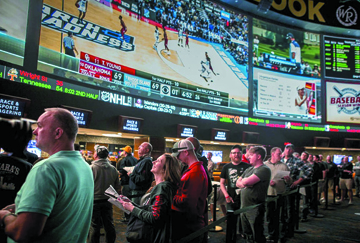The Winners And Losers Of Legalized Sports Betting In Colorado “One of the worst things that can happen to you in life is to win a bet on a horse at an early age.”
Dan McGoorty
by Luke Schmaltz
On May 14, 2018, in a lawsuit filed by the State of New Jersey, the Supreme Court of the United States ruled that the Professional and Amateur Sports Protection Act (PASPA) of 1992 was unconstitutional. Removal of this piece of anti-gaming legislation opened the sports betting floodgates. Currently, a deluge of widely accessible sports wagering is fanning out across the nation and is steadily flowing to the north, to the south, across the Midwest and toward the west coast.

After the Garden State legalized sports betting one month later, other states began following suit (19 total to date) including New York, Pennsylvania, Iowa, Illinois and most recently, Colorado. Currently, 18 more states including Kansas, Missouri, Texas and California are introducing similar legislation that will allow anyone with an internet connection or a mobile device to get in on the action. The indications are two-fold — pointing to massive tax revenues for state programs along with daunting potential for negative social impact.
In Colorado, the ballot measure that passed by a narrow margin on November 5 will grant the 33 licensed casinos in Black Hawk, Central City and Cripple Creek the ability to offer betting on collegiate, professional, Olympic and motor sports. Beginning in May 2020, wagers can be placed in person at a casino sportsbook or online from anywhere in the state. The second part of that allowance is where the issue compounds. Widespread accessibility equates to more tax revenue and at the same time means more inexperienced gamblers and folks who are simply prone to addictive behavior will be blowing kisses from afar at lady luck.
The Good
Colorado Proposition DD passed by the thinnest of margins — 50.8% to 49.2% to be exact — which equates to about 20,000 votes or so. It can be safely surmised that the idea won favor with voters because it was introduced in conjunction with a previously passed bill applying a 10% flat tax on sports betting.
This means that a sizable chunk of net sports betting revenue will flow directly to the coffers of the Colorado Water Conservation Board. These funds will be leveraged to implement the state’s water plan (introduced by the office of former Governor John Hickenlooper) to meet agricultural needs and the demands of a booming population. This explains the appeal of the measure across so many demographics within a populace that is seemingly more concerned with infrastructure planning, economic growth and environmental issues and less adamant about the right to legally gamble on Sunday’s big game.
For those who are adamant about their right to legally wager on sports, the money is doubled, so to speak. Not only can they gamble the game of their choosing without breaking the law, they can skip waiting in line at the betting window and play the odds from the convenience of their homes.
The Bad
Now that anyone in Colorado over 18 will soon be able to gamble on any game at any time from anywhere, there’s an excellent chance that the more pertinent issues listed above may be further obscured by this newfangled vice. The best way to speculate on what is in store for our Rocky Mountain State is to look back to New Jersey, where sports betting has been legal for over a year. Officials from the Council of Compulsive Gambling of New Jersey (CCGNJ) are expressing concern over the fact that a 2019 Rutgers University survey discovered that 6.3 percent of state residents have a gambling disorder — three times the national average. Executive Director Neva Pryor explains: “It’s that accessibility that makes it

[gambling]
so easy.” Meanwhile, CCGNJ co-founder Arnie Wexler attests: “Two years from now you won’t be able to get a seat in a Gamblers Anonymous room because … people that never would gamble on sports illegally are now gambling on sports.”
This is due largely to the fact that participants are using online sportsbooks like FanDuel and DraftKings and/or mobile apps developed by individual casinos. The convenience of digital wager placement and the allure of immediate payment have direct appeal to those who subscribe to the instant gratification mindset. Couple that with rampant cell phone addiction that is already in place for many, and you have another “double your money” scenario. On this side of the coin, however, the odds play on the inherent weaknesses of those prone to compulsive behavior.
The Ugly
Initially, the top four major professional athletic leagues — NFL, NBA, MLB and NHL — opposed legalization of sports gambling. Yet, since PASPA was overturned they have all quickly assimilated into the marketplace to secure their cut of the action. The NFL has inked a sponsorship deal with Caesars Palace while the other three leagues have similar contracts in place with MGM Grand.

The four entities above, along with boxing, golf, horse racing, tennis, wrestling and many more (that means you, college sports) have well-documented histories of game fixing, rigging schemes and gambling infestations of many stripes. Now that the leagues themselves have a direct interest in betting revenue, gambling terms like “house rules” and “the fix is in” may take on meaning of a never-before-seen magnitude.
What’s more, ESPN and FOX Sports 1 both have shows dedicated to sports betting. As the phenomenon sweeps the nation state by state, the ubiquity of it all could spell a distinct change in how events are called by sportscasters. Wager and odds-based commentary may become the dominating aspects of the live broadcast narrative rather than the facts of the contest at hand.
Finally, to top it all off with a formidable one-uppance, not only can mobile app gamblers wager on an event when it is still underway, they can also bet on just about any aspect of the game at hand. At any point during play, a bettor can wager on such factors as Brandon Allen getting sacked a certain number of times, Jamal Murray hitting his next three-pointer or whether Nolan Arenado connects with the next fastball. Whatever the sport — that’s one way to empty out a bank account in record time.
